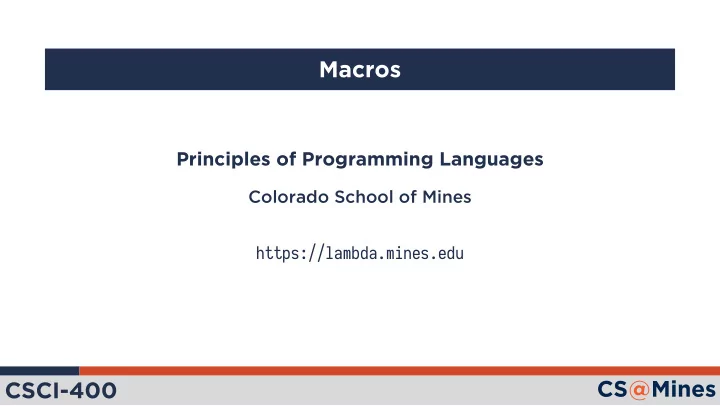

Macros Principles of Programming Languages Colorado School of Mines https://lambda.mines.edu CSCI-400
Even in the best software designs, it’s hard to avoid repetitive patterns. What if our language let us extend its syntax to account for these patterns? Exercise for Home Find a piece of code you wrote (in any language) which repeats a syntax pattern you couldn’t avoid by writing a function, class, etc. Motivation CSCI-400
(Python does not support above) We can implement most all of the functionality we need in Python using functions. What do I mean by "extend syntax"? But can we implement something like Racket’s let in Python? let (x = 10, y = 20) in: print(x, y) CSCI-400
(they can get a little more complicated than that...) The C Preprocessor lets us do simple text substitutions: But what happens when we want to do more complex things? Like manipulate the How about C Macros? #define FOREVER for (;;) main () { FOREVER { printf("Hello, World! \n "); } } body of that " FOREVER loop"? CSCI-400
At some point, textual source manipulation cannot serve the purpose we need anymore. Let this source from MicroPython serve as an example: C Macros STATIC mp_obj_t machine_spi_init(...) { ... } STATIC MP_DEFINE_CONST_FUN_OBJ_KW(machine_spi_init_obj, 1, machine_spi_init); STATIC mp_obj_t machine_spi_deinit(...) { ... } STATIC MP_DEFINE_CONST_FUN_OBJ_1(machine_spi_deinit_obj, machine_spi_deinit); STATIC mp_obj_t mp_machine_spi_read(...) { ... } MP_DEFINE_CONST_FUN_OBJ_VAR_BETWEEN(mp_machine_spi_read_obj, 2, 3, mp_machine_spi_read); CSCI-400 STATIC mp_obj_t mp_machine_spi_readinto(...) { ... } MP_DEFINE_CONST_FUN_OBJ_VAR_BETWEEN(mp_machine_spi_readinto_obj, 2, 3, mp_machine_spi_readinto);
Hopefully it’s become apparent that symbolic computation is the right tool for the job when it comes to macros. Lisp Macros: Compile time Lisp Functions: Run time Lisp dialects usually make the run time available during the compile time, so the normal language can be used to write macros. Lisp Macros Syntax → Syntax Data → Data CSCI-400
Macros as Syntax Transformers YOU ARE INSIDE A ROOM. THERE ARE KEYS ON THE GROUND. THERE IS A SHINY BRASS LAMP NEARBY. IF YOU GO THE WRONG WAY, YOU WILL BECOME HOPELESSLY LOST AND CONFUSED. > pick up the keys YOU HAVE A SYNTAX TRANSFORMER CSCI-400
Early Lisp macro systems operated on the simple contract of functions which take syntax, manipulate it, and returns a list containing the new syntax: Old-School Lisp Macros (defmacro repeat-forever ( &rest body) `(prog () a ,@body ( go a))) ;; we can then use the macro like this: (repeat-forever (format t "HELLO WORLD~%")) CSCI-400
"let" as a macro: Old-School: More Examples (defmacro let (bindings &rest body) `(( lambda ,(mapcar #'car bindings) ,@body) ,@(mapcar #'cadr bindings))) ;; we can then use let like this: ( let ((a 10) (b 20)) (format t "~A ~A~%" a b)) CSCI-400
We could write a macro like this: Suppose we wanted to defjne a syntax like this: What could possibly go wrong? Old-School: Another Example (numeric-case num negative zero positive) (defmacro numeric-case (num negative zero positive) `( let ((result ,num)) (cond ((< result 0) ,negative) ((= result 0) ,zero) (t ,positive)))) CSCI-400
Fixing numeric-case with gensym gensym is here to save us when we need really obscure symbol names: (defmacro numeric-case (num negative zero positive) ( let ((sym (gensym))) `( let ((,sym ,num)) (cond ((< ,sym 0) ,negative) ((= ,sym 0) ,zero) (t ,positive))))) CSCI-400
What happens if the programmer redefjned one of the functions we used Unhygienic Macros Modern Lisp dialects typically provide what is called hygienic macros : macro systems which eliminate the issues we discovered with old-school Lisp macros (to varying degrees) More Macro Issues (e.g., < or = ) in the previous example? CSCI-400
and returns a "syntax". Typical syntax operations provide a convenient way to manipulate the syntax in a hygenic manner. Racket's Hygienic Macros define-syntax defjnes compile-time syntax: a function that takes a "syntax" You can also go unhygienic: syntax->datum converts syntax to lists, symbols, etc., and datum->syntax goes back. CSCI-400
And back: We can convert this to a list if we wish: 1 Note this is completely difgerent from the function-namespace thing in old-school Lisps. What is a "syntax"? Syntax literals can be written using #' 1 : > #'(if (> 0 x) y z) #<syntax:readline-input:1:2 (if (> 0 x) y z)> > (define stx #'(if (> 0 x) y z)) > (syntax->datum stx) '(if (> 0 x) y z) > (datum->syntax stx (syntax->datum stx)) #<syntax (if (> 0 x) y z)> If you didn’t have access to the original syntax object, you could pass #f as the fjrst argument to datum->syntax . CSCI-400
A little bit yucky, but it worked. Going Unhygienic We could write our let macro without considerations for hygiene: ( define-syntax (my-let stx) (datum->syntax stx ( let ([stx-list (syntax->datum stx)]) `((lambda ,(map car (cadr stx-list)) ,@(cddr stx-list)) ,@(map cadr (cadr stx-list)))))) CSCI-400
Doing Things Hygienic syntax-case acts like match but for syntax objects: ( define-syntax (my-let stx) ( syntax-case stx () [( _ ([name expr] ... ) body ... ) #'(( lambda (name ... ) body ... ) expr ... )])) CSCI-400
single rule inside. de�ne-syntax-rule Shorthand define-syntax-rule is a shorthand for a define-syntax with a syntax-case of a ( define-syntax-rule (my-let ([name expr] ... ) body ... ) (( lambda (name ... ) body ... ) expr ... )) CSCI-400
anaphor In natural language, anaphora is a reference to a previously defjned noun: Susan dropped the plate Available in a Racket Package Lisp programmers call a similar technique the same name: shattered loudly! referent . It Application of Macros: Anaphora ���� � �� � (printf "~a~%" (aif (member 10 lst) it "10 not in the list")) The "anaphoric" package provides aif , awhen , acond , and aand . CSCI-400
Example from "Fear of Macros", which you will read for the LGA this weekend. Anaphoric If ( require racket/stxparam) (define-syntax-parameter it ( lambda (stx) (raise-syntax-error (syntax-e stx) "outside of anaphora"))) ( define-syntax-rule (aif predicate consequent alternative) ( let ([result predicate]) ( if result (syntax-parameterize ([it (make-rename-transformer #'result)]) consequent) alternative))) CSCI-400
Recommend
More recommend